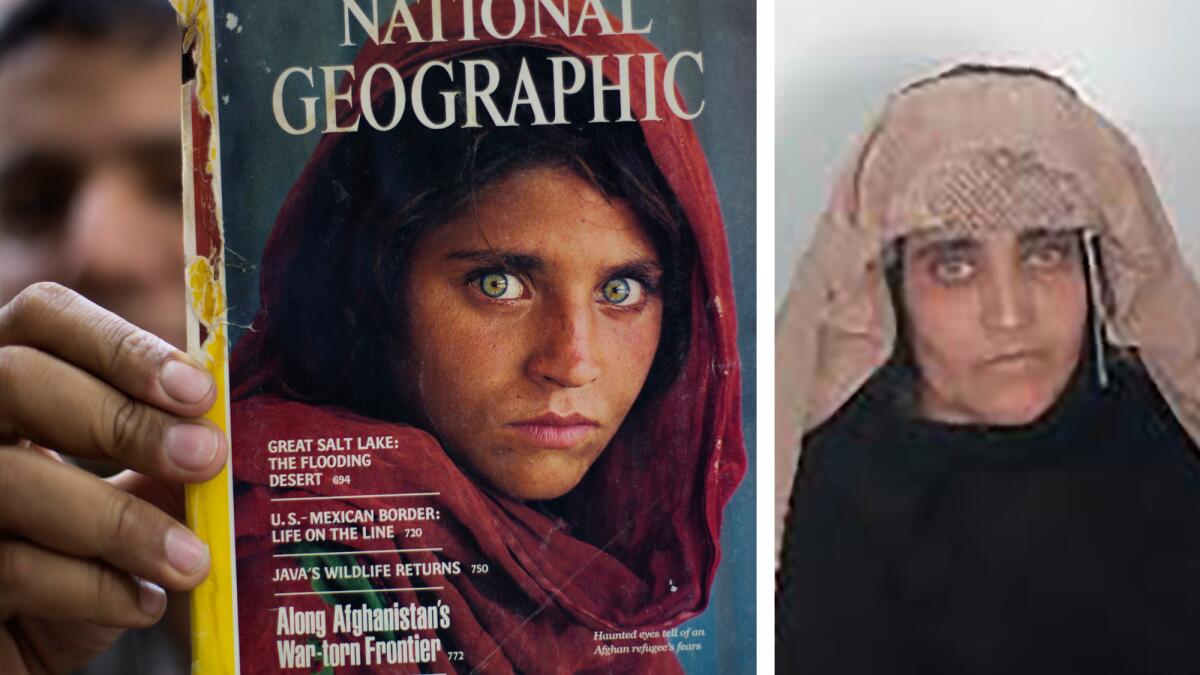Her arresting gaze was on the cover of a National Geographic bestseller. Now sheâs in a Pakistan jail

Reporting from Peshawar, Pakistan â She has been called the Mona Lisa of Afghanistan, the emerald-eyed refugee girl who appeared on the cover of National Geographic magazine in 1985 in one of the most famous news photographs ever taken.
On Wednesday, Sharbat Gula was jailed in Pakistan on charges of falsifying her identity papers.
For the record:
8:57 a.m. Nov. 27, 2024An earlier version of this report said Sharbat Gula is 47 years old. Gulaâs exact age is not known, but she was estimated to have been 12 when the iconic photo was taken in 1984, which would make her about 44 now.
Gula, who is in her forties, appeared before a judge in the northwestern city of Peshawar after authorities arrested her for possessing a forged Pakistani national identity card. The judge ordered her held at Peshawarâs central prison pending a trial.
Hundreds of thousands of Afghan refugees in Pakistan hold the Computerized National Identity Cards, but Pakistani officials have launched investigations into allegedly fraudulent documents as part of a drive to expel Afghans from the country.
Pakistanâs Federal Investigation Agency said it was investigating allegedly fraudulent identity cards issued to Gula and two men identified on registration forms as her sons.
âThe lady had obtained a Pakistani citizenship card in 2014 and also possessed an Afghan refugee identification card as well as an Afghan passport on which she had traveled to perform the hajj,â the Muslim pilgrimage to Mecca, said Shahid Ilyas, assistant director of the agency.
If convicted, Gula faces up to 14 years in prison and a fine of $1,000.
Gula has four children, including a 5-year-old son, whom authorities described as âgrief-strickenâ following their motherâs arrest. Her husband, an Afghan baker, died about five years ago.
Gula shot to fame when National Geographic photographer Steve McCurry captured her penetrating gaze, framed by a red shawl, in a refugee camp near Peshawar. Her age was unknown at the time the photo was taken because there were no records in the refugee camp, but she was thought to be 12 years old. Like millions of Afghans, her family had fled a raging civil war when McCurry found her at a makeshift girlsâ school in the camp.
âI noticed this one little girl with these incredible eyes, and I instantly knew that this was really the only picture I wanted to take,â McCurry told NPR last year.
Her image was featured on the cover of the June 1985 edition of National Geographic and became the magazineâs all time best-selling cover.
Gula remained anonymous for years after the photo was taken, until National Geographic found her in 2002. Her family granted her permission to meet McCurry, and Gula told the magazine that she recalled being angry with him for taking her picture because she had never been photographed before.
Beginning with the 1979 Soviet invasion of Afghanistan, Pakistan has hosted 1.5 million Afghan refugees, along with another 1 million living in the country without documentation. But officials this year have cracked down on those suspected of living here illegally and increased pressure on refugees to return home despite continued violence in Afghanistan.
The United Nations refugee agency said last week that 370,000 registered and undocumented Afghan refugees had returned from Pakistan in 2016. Some 52,000 crossed in one week this month, the most in a seven-day period since 2009.
Human rights groups accuse Pakistani authorities of raiding or destroying Afghansâ homes, carrying out arbitrary arrests and harassing or extorting refugees to force them to leave.
Special correspondent Ali reported from Peshawar and staff writer Bengali from Mumbai, India.
Follow @SBengali on Twitter for more news from South Asia
MORE WORLD NEWS
Islamic State is stunning its adversaries with the ferocity of its counterattacks
Liberated civilians or militants in disguise? The challenge of freeing a village from Islamic State
The âworldâs saddestâ polar bear is trapped in a tiny cage at a shopping mall in China
More to Read
Sign up for Essential California
The most important California stories and recommendations in your inbox every morning.
You may occasionally receive promotional content from the Los Angeles Times.











